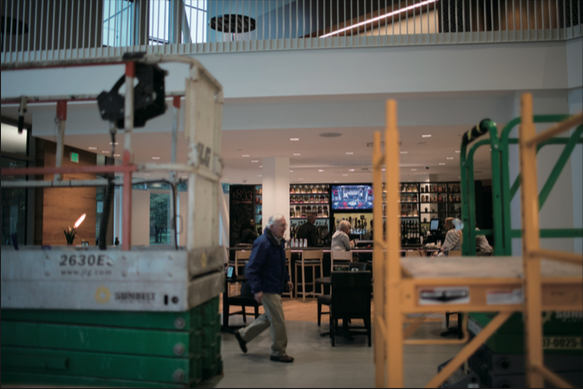Climate Conference Draws Leading Activists

Photo by Rick Yu, Photo editor
A visitor at The Hotel at Oberlin strolls past the bar. While construction continues on portions of the Peter B. Lewis Gateway Center, the hotel will host its first large conference Oct. 6–8 with participation from Arnold Schwarzenegger and famous environmentalist Bill McKibben.
September 30, 2016
Some of the biggest names in environmentalism will come to town for The Hotel at Oberlin’s first major event this week.
In response to growing national awareness and urgency about climate change, the College will host “After Fossil Fuels: The Next Economy,” a conference Oct. 6–8 on transitioning to a clean-energy economy.
According to David Orr, the event’s organizer and special assistant to the College president on sustainability and the environment, the conference will address ways to reconcile the economy with a sustainable environment.
“We’re trying to begin to align the way the economy works with the way the world works,” Orr said. “Right now the economy is one of the drivers off the cliff, powered by fossil fuels, too much growth and producing a lot of inequity and unfairness and so forth, and the goal is to begin to rethink all of this.”
The event is attracting many influential environmental, business and political leaders, such as former Governor Arnold Schwarzenegger; renowned environmentalist Bill McKibben; Michael Brune, president of the Sierra Club; and Tom Steyer, founder of NextGen Climate and funder of environmentalist political campaigns.
The Hotel at Oberlin is one of few LEED Platinum hotels in the United States, so it is fitting that the first major event at the center is meant to change the way the world approaches climate change.
“For the Board of Trustees, they know what this place is and the goal is to show them what it can do. It can attract major people, it can attract big discussions — we can do that here,” Orr said. “The question is whether we can be part of this international and global dialogue in what is clearly a transitional era in human history. Time is not our friend here.”
However, while Orr and other administrators hoped the new hotel would host many events for the College, they also intended it to be a way to sustainably build the local economy. When considering the project, Orr reflected on the community surrounding the College, a rust belt community with a poverty rate between 20 to 25 percent — a community that desperately needs an economic driver. Orr also wanted something that would reflect the priorities of the College.
“The Hotel is not just a hotel; it’s a means to a larger end, a bigger conversation about the role we want to play in today’s world,” Orr said. “We want to see some changes in everything from Oberlin College curriculum, to local economic planning and thinking to next events elsewhere around the country and around the world.”
Some students have questioned the utility of spending at least $18 million on a building that appears only tangentially related to the mission of the College.
Double-degree senior and Student Senate Liaison Jeremy Poe said it is not yet clear if the Hotel’s benefits will outweigh the cost.
“When evaluating benefits, Oberlin can’t simply ask what the space is being used for, but rather how well it is being used,” Poe wrote in an email to the Review. “The Gateway Center will reportedly include a new office for Admissions, a performance space, multiple classrooms and the Hotel. But the lesson that should be learned from the Kohl and Kahn buildings is that however impressive a project may be, the buildings may not work as well or the same way as intended.”
College junior and Student Senator Jesse Docter noted how the College often claims to have no money when students make demands, only to later announce multimillion-dollar capital projects put into motion with no student input.
“It’s difficult for us to assess the financial picture of the College because the financial-planning picture is so different from the answers we get about day-to-day demands,” Docter said.
To President Marvin Krislov, however, the choice to build a new facility instead of renovating the old one was clear.
“We were having a difficulty retaining business,” Krislov said. “Conferences were not willing to come there. Visitors were not happy. I thought there were many positive things about the Inn, but overall the analysis was that it needed to be replaced and the money that we would spent to renovate it was not going to change the fundamentals, which was that it was not a great facility.”
Krislov also noted that much of the funding for the Hotel came from sources that would have been unavailable for other projects.
“There were many people who very excited about the vision for the Hotel — a LEED Platinum Hotel with more space for conferences — so we were able to get money both from private individuals … and new market tax credits and other devices,” Krislov said.
Most of the prominent discussions and seminars will be aired by the environmental- streaming company NMG Live and will be available online for anyone who wants to watch.
Financial support for the conference is being provided by the Rockefeller Brothers Fund, the V. Kann Rasmussen Foundation, Veris Wealth Partners, the George Gund Foundation, the Cleveland Foundation, the Lorain County Community Foundation and 12 anonymous donors.




















